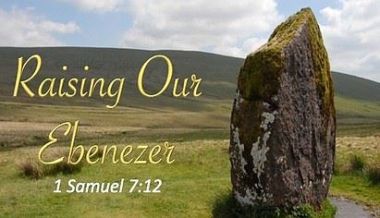
English author, Charles Dickens, owes the Christian Church an apology. Ever since Dickens published his short novel, ‘A Christmas Carol’ in 1843 the name Ebenezer has had bad press. If you doubt that, ask yourselves how many males (and Ebenezer is masculine name!) …how many males do you know who are called Ebenezer? You’re a rarity today if you have the name Ebenezer. I have never in my life met an Ebenezer. That fount of all wisdom, Wikipedia, has a long list of people with the given name Ebenezer, however of the 170 names listed, by far the bulk of them were born and named before Dickens had published his book. Of those that are born after that date most are from countries that did not have to cope with this fallout from English literature.
So why am I engaging in a rant about a novel from the nineteenth century? Well, I was recently speaking to someone who was contemplating a move into a Christian retirement village. The retirement village happens to be called Ebenezer. My friend was gently chided by an acquaintance who asked him: “Why would you move into a place that reminds us of Ebenezer Scrooge?”
Well, there you go. Ebenezer Scrooge was the stingy anti-hero of Dickens’ A Christmas Carol. He’s the businessman who under-pays his clerk, Bob Cratchit. He relentlessly hounds his debtors while living economically (but with no joy) in the apartment of his late business partner. Ebenezer Scrooge is particularly known for his dislike of Christmas which he associates with reckless spending. His favourite expression to dismiss Christmas is, “Bah! Humbug!” Charles Dickens describes Scrooge as “a squeezing, wrenching, grasping, scraping, clutching, covetous, old sinner!” I think you get the picture and understand why anyone who knows the story would be rather reluctant to call their son Ebenezer.
But that’s where Dickens did the Christian Church (and I should add, Judaism too) a massive disservice. Why didn’t our very British ‘uncle Charles’ choose a different name and not inflict the English speaking world with such negative connotations for the name Ebenezer – although to be honest – the name Scrooge has possibly suffered a worse ignominy. But Dickens could have simply named him Robert Scrooge… or why not something more exotic, like Octavius Scrooge?
The point is that Ebenezer is a Biblical name – and a very beautiful and meaningful one at that. What a pity it now has such negative connotations for those who love English literature.
Ebenezer is actually mentioned three times in the Bible – in the first book of Samuel. The first two times it is simply mentioned as the name of a place where the nation of Israel did battle with the Philistines. In the first instance Israel suffered there a terrible defeat. The Ark of the Covenant – the very symbol of God’s presence with His people – was captured by the Philistines and so the second reference tells us that the Ark was taken from Ebenezer to Ashdod.
But the third reference in 1Samuel 7:12 relates how the place got its name. After the Ark of the Covenant had been returned, Israel was again attacked by the Philistines but when Samuel prayed for God’s help the Philistines were routed and Israel gained a wonderful victory with God’s help. It was after that victory that Samuel set up stone there and called it Ebenezer. Its meaning is Stone of Help. Ebenezer was to be a permanent reminder that the Lord God is a rock of refuge for those who trust in Him. Samuel himself commented at the time, “The Lord has helped us to this point!”
The name Ebenezer has found itself into the hymnody of the Christian Church. There’s a song with the title, “Come Thou fount of every blessing”. Its second verses goes as follows: Here I raise my Ebenezer / By thy help I come; / And I hope, by Thy good pleasure, / Safely to arrive at home. These days we would have to explain what it means to “raise our Ebenezer”. But what a wonderful picture. A stone set up – as so many memorials have been erected over the millennia – but this one a tangible reminder that the Lord is a rock of refuge for those who trust in Him. And that’s still what Jesus is for us today. Am I hoping for too much when I dream that one day Christians will again begin to call their sons Ebenezer? We mustn’t let Charles Dickens put us off.
John Westendorp
